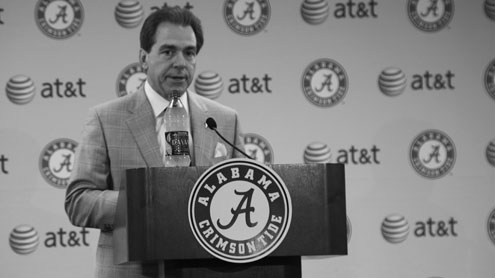 Last summer, the Southeastern Conference presidents made a decision that significantly affected how recruiting is done within the conference. As many people have discussed, the practice of over-signing became a habit for many schools, Alabama included.
Last summer, the Southeastern Conference presidents made a decision that significantly affected how recruiting is done within the conference. As many people have discussed, the practice of over-signing became a habit for many schools, Alabama included.
The long time SEC rule has been that a team can only give 25 football scholarships a year. Typically, coaches give out many more than 25 scholarship offers, knowing that many will commit elsewhere. They know many others will never make it to a Division 1 school because of injuries or various other off-field problems.
For years, many coaches would accept more than 25 commitments in anticipation of not all 25 enrolling in school the following season. Because of this, a few players are asked to “grayshirt,” so their scholarship does not count against the original 25 that year.
All the grayshirt means is they forego the fall season and enroll in the spring semester. They are not officially on the roster until the spring and not counted against the 25-scholarship limit. A grayshirt is typically given to a recently injured player or, in some cases, a player that is not expected to make much of an impact his freshman season.
Grayshirting is not an indictment on their playing career but merely a temporary solution to a numbers problem. It allows elite programs to recruit players that truly want to play for them, but may not be completely ready their first year. It is called over-signing because more than 25 players sign a letter of intent, with the institution knowing that some of them will not enroll in school the following fall.
Also, if an academic or off-field problem does arise, it gives a coach room to remove the grayshirt off one of his recruits and bring him in for the fall, so they can still meet their 25-scholarship quota.
Basically, over-signing gives coaches a safety net if one of their players has a surprise grade concern. It also gives teams an early advantage for players destined for junior college but will continue their recruitment until they are enrolled in a Division 1 school.
Last June, SEC coaches passed legislation prohibiting over-signing. Despite a 12-0 vote by the coaches to keep the signing limit at 28, SEC presidents voted unanimously to drop it down to 25. Now, regardless of which players fail to qualify after signing day or if players decide to change commitments at the last minute, programs will lose a recruit they would have otherwise signed because of a numbers crunch.
If this rule were in place in 2008, Marcel Dareus probably would have ended up at Auburn or North Carolina. The Tide was in a numbers crunch and signed 32 players that year. Out of that class, some never qualified academically, two pursued a professional baseball career and several grayshirted.
That No. 1 ranked class included stars such as Mark Ingram, Julio Jones and Dont’a Hightower. Dareus was one of the underrated players in that class that nobody anticipated to make the impact he did. He would have been one of the first players informed to look elsewhere or asked to greyshirt because Alabama was out of room.
Darius Philon was recently left out of Alabama’s 2012 recruiting class. While he has been an Alabama commitment since September, a major knee injury and Alabama signing multiple players at his position led to Alabama offering a grayshirt just days before National Signing Day.
Because of the sudden disappointment, Philon decided to sign with Arkansas, so he can enroll immediately in the fall. Despite the fact that he is in need of major knee surgery and had virtually no shot at playing time next year, Philon signed with the school that he felt wanted him the most. Understandable.
The only reason Philon is not signed with Alabama is because of the new SEC limit. Likewise, there are many recruits across the state and southeast that probably would have held Alabama offers if there wasn’t such a tight scholarship limit.
Obviously, this causes a domino effect with the second- and third-tier team’s inability to sign as many players. Arkansas doesn’t sign that two-star tight end and Vanderbilt doesn’t sign that unranked linebacker because they don’t have room. Fewer scholarships are given out now, and fewer kids are getting to attend college.
While coaches like Nick Saban will always find themselves through a roster management loophole, hundreds of kids each year are not getting the scholarships they could have once potentially received. In an attempt to slow down the major football programs and give smaller SEC schools a fair shot at recruiting, the SEC presidents ended up hurting the one group that truly doesn’t deserve it: The players.
Jake Gray is a senior majoring in economics and journalism. His column runs on Tuesdays.









